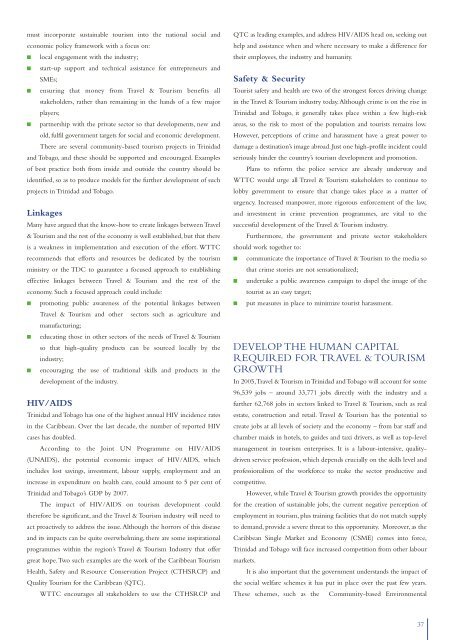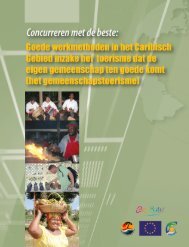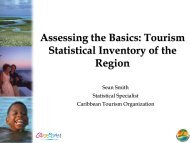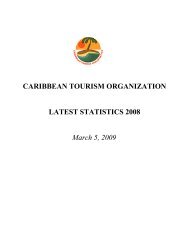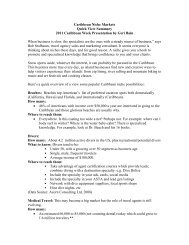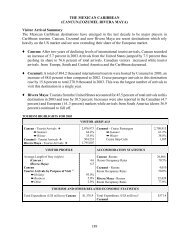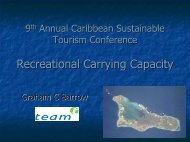TRINIDAD AND TOBAGO - Caribbean Tourism Organization
TRINIDAD AND TOBAGO - Caribbean Tourism Organization
TRINIDAD AND TOBAGO - Caribbean Tourism Organization
You also want an ePaper? Increase the reach of your titles
YUMPU automatically turns print PDFs into web optimized ePapers that Google loves.
must incorporate sustainable tourism into the national social and<br />
economic policy framework with a focus on:<br />
■ local engagement with the industry;<br />
■ start-up support and technical assistance for entrepreneurs and<br />
SMEs;<br />
■ ensuring that money from Travel & <strong>Tourism</strong> benefits all<br />
stakeholders, rather than remaining in the hands of a few major<br />
players;<br />
■ partnership with the private sector so that developments, new and<br />
old, fulfil government targets for social and economic development.<br />
There are several community-based tourism projects in Trinidad<br />
and Tobago, and these should be supported and encouraged. Examples<br />
of best practice both from inside and outside the country should be<br />
identified, so as to produce models for the further development of such<br />
projects in Trinidad and Tobago.<br />
Linkages<br />
Many have argued that the know-how to create linkages between Travel<br />
& <strong>Tourism</strong> and the rest of the economy is well established, but that there<br />
is a weakness in implementation and execution of the effort. WTTC<br />
recommends that efforts and resources be dedicated by the tourism<br />
ministry or the TDC to guarantee a focused approach to establishing<br />
effective linkages between Travel & <strong>Tourism</strong> and the rest of the<br />
economy. Such a focused approach could include:<br />
■ promoting public awareness of the potential linkages between<br />
Travel & <strong>Tourism</strong> and other sectors such as agriculture and<br />
manufacturing;<br />
■ educating those in other sectors of the needs of Travel & <strong>Tourism</strong><br />
so that high-quality products can be sourced locally by the<br />
industry;<br />
■ encouraging the use of traditional skills and products in the<br />
development of the industry.<br />
HIV/AIDS<br />
Trinidad and Tobago has one of the highest annual HIV incidence rates<br />
in the <strong>Caribbean</strong>. Over the last decade, the number of reported HIV<br />
cases has doubled.<br />
According to the Joint UN Programme on HIV/AIDS<br />
(UNAIDS), the potential economic impact of HIV/AIDS, which<br />
includes lost savings, investment, labour supply, employment and an<br />
increase in expenditure on health care, could amount to 5 per cent of<br />
Trinidad and Tobago’s GDP by 2007.<br />
The impact of HIV/AIDS on tourism development could<br />
therefore be significant, and the Travel & <strong>Tourism</strong> industry will need to<br />
act proactively to address the issue. Although the horrors of this disease<br />
and its impacts can be quite overwhelming, there are some inspirational<br />
programmes within the region’s Travel & <strong>Tourism</strong> Industry that offer<br />
great hope.Two such examples are the work of the <strong>Caribbean</strong> <strong>Tourism</strong><br />
Health, Safety and Resource Conservation Project (CTHSRCP) and<br />
Quality <strong>Tourism</strong> for the <strong>Caribbean</strong> (QTC).<br />
WTTC encourages all stakeholders to use the CTHSRCP and<br />
QTC as leading examples, and address HIV/AIDS head on, seeking out<br />
help and assistance when and where necessary to make a difference for<br />
their employees, the industry and humanity.<br />
Safety & Security<br />
Tourist safety and health are two of the strongest forces driving change<br />
in the Travel & <strong>Tourism</strong> industry today.Although crime is on the rise in<br />
Trinidad and Tobago, it generally takes place within a few high-risk<br />
areas, so the risk to most of the population and tourists remains low.<br />
However, perceptions of crime and harassment have a great power to<br />
damage a destination’s image abroad. Just one high-profile incident could<br />
seriously hinder the country’s tourism development and promotion.<br />
Plans to reform the police service are already underway and<br />
WTTC would urge all Travel & <strong>Tourism</strong> stakeholders to continue to<br />
lobby government to ensure that change takes place as a matter of<br />
urgency. Increased manpower, more rigorous enforcement of the law,<br />
and investment in crime prevention programmes, are vital to the<br />
successful development of the Travel & <strong>Tourism</strong> industry.<br />
Furthermore, the government and private sector stakeholders<br />
should work together to:<br />
■ communicate the importance of Travel & <strong>Tourism</strong> to the media so<br />
that crime stories are not sensationalized;<br />
■ undertake a public awareness campaign to dispel the image of the<br />
tourist as an easy target;<br />
■ put measures in place to minimize tourist harassment.<br />
DEVELOP THE HUMAN CAPITAL<br />
REQUIRED FOR TRAVEL & TOURISM<br />
GROWTH<br />
In 2005,Travel & <strong>Tourism</strong> in Trinidad and Tobago will account for some<br />
96,539 jobs – around 33,771 jobs directly with the industry and a<br />
further 62,768 jobs in sectors linked to Travel & <strong>Tourism</strong>, such as real<br />
estate, construction and retail. Travel & <strong>Tourism</strong> has the potential to<br />
create jobs at all levels of society and the economy – from bar staff and<br />
chamber maids in hotels, to guides and taxi drivers, as well as top-level<br />
management in tourism enterprises. It is a labour-intensive, qualitydriven<br />
service profession, which depends crucially on the skills level and<br />
professionalism of the workforce to make the sector productive and<br />
competitive.<br />
However, while Travel & <strong>Tourism</strong> growth provides the opportunity<br />
for the creation of sustainable jobs, the current negative perception of<br />
employment in tourism, plus training facilities that do not match supply<br />
to demand, provide a severe threat to this opportunity. Moreover, as the<br />
<strong>Caribbean</strong> Single Market and Economy (CSME) comes into force,<br />
Trinidad and Tobago will face increased competition from other labour<br />
markets.<br />
It is also important that the government understands the impact of<br />
the social welfare schemes it has put in place over the past few years.<br />
These schemes, such as the Community-based Environmental<br />
37


